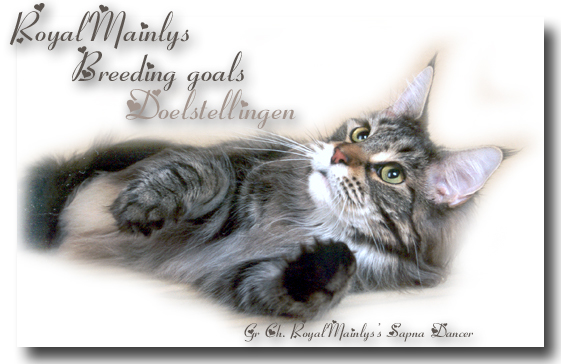

|
|
To produce healthy, sweet, happy, and beautiful Maine Coons and to keep quality above quantity. |
|
|
To work with other breeders who have similar standards. But always respect everybody's his opinion. |
|
|
To actively show our cats (in TICA and FIFE) as we believe showing is essential to know that our Maine Coons meet the breed standard. Showing also provides great networking between friends & breeders. |
|
|
Our breeding cats are all negative tested on HCM, PKD, Patella luxatie, FeLV FIV. And our breeding males are examined by our vet to make sure the testicles are descended. |
|
|
ALL of our cats are regularly examined and vaccinated by our vet. We have a wonderful working relationship with our vet Emil Visnjaric & his staff from the Vet clinic Walenburg. Feel free to contact them as a reference to the care we provide our cats & the good health they are all in. |
|
|
All of our breeding's are carefully planned, with every cat's pedigree kept in mind. |
|
|
To spay and neuter all pet kittens. And make sure all kittens who leave the castle of Royalmainlys will have a certificated pedigree from our cat club the Cats and Tulips, a European Union passport for companion animals, be examined and vaccinated two times by our vet (with 7 and 12 weeks of age), have a microchip and show/breeder kittens also will have a TICA registration and a rabies vaccination. |
|
|
To test all our cats on
the new HCM DNA MYBPC3. But we not take our breeding cat out of our
breeding program if they are positive because we are from opinion; Maine coons, like all cats, are affected by a genetic, inherited, dominant-gened disease called Hypertrophic Cardiomyopathy or HCM. We advise everyone to Google HCM in cats and in Maine coons and read about it. We, and many other breeders, routinely screen our cats' hearts thru echocardiosonography, done by veterinary cardiologists. This is the most valuable tool, by far, for detecting clinical HCM and tells us the state of each cat's heart at the time of the echo. HCM can be early or late onset in a cat's life and it can be very mild to very severe and cause death. It can also never manifest, even though the cat has the genetic code for HCM and therefore technically has HCM. In humans, there are 400 different mutations that cause HCM. Recently, 1 mutation has been discovered for Maine coons and there is a DNA test for this mutation. Unfortunately, the geneticists who developed this DNA-test do not know what it implies. 34% of the over 1000 Maine coons that have been tested have this 1 mutation. However, the vast majority of these DNA-positive cats do not have any clinical HCM when they are echoed. The geneticists who developed the HCM-DNA test are unable to predict what positive DNA means, if this means 5% or 50% or 100% of DNA-positive cats will go on to develop clinical signs of HCM, and if they do, when they will develop them or how mild or severe their HCM will be. Because this DNA-HCM test is new, and has no long term studies or predictable outcomes for the short or long term, we have decided, until further studies are done, more information is available and there are real statistics to help us make informed choices, to not base my breeding program whatsoever on this 1 DNA mutation test. Currently all of our cats are DNA-tested but we will continue to rely on echocardiosonograms, which remain the only way to diagnose active, clinical HCM. |
|
|
HCM New to the HCM
Gentest of the medical small animal hospital of the Ludwig Maximilians
university in Munich was accomplished a study to the two gene tests on
HCM, available in Germany, with Maine Coons. The result shows that the
gene test does not bring anything. The study resulted in that Maine
Coons with HCM are just as frequently positively tested in the gene
test, as Maine Coons without HCM. Conclusions: With the examined patient number no association was found between the HCM and the examined Polymorphismen. The gold standard for the breed selection exists further in the annual echokardiographischen investigation.
|
![]()